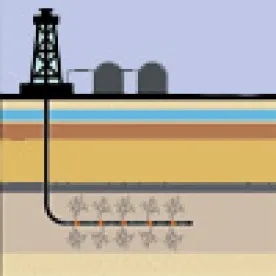In its June 30, 2015 opinion, Landra v. New Dominion, LLC, the Oklahoma Supreme Court held that a personal injury tort action alleging that fracking-related activity caused an earthquake that then caused the plaintiff’s injuries can proceed in an Oklahoma district court. The Oklahoma Supreme Court made no factual or legal findings with respect to the merits of the claims of causation, it simply held that the district court has jurisdiction to hear the suit based on the allegations made.
The Landra plaintiff is resident of Prague, Oklahoma, and her lawsuit seeks compensatory and punitive damages for injuries allegedly proximately caused by the defendants wastewater disposal practices. The plaintiff claims that in November 2011 she was watching television in her living room when a 5.0 magnitude earthquake struck causing rock facing on the two-story fireplace and chimney to fall onto her causing injury to her knees and legs. She claims personal injury damages in excess of $75,000.
The plaintiff has asserted a private tort action alleging that the defendants were engaged in “ultrahazardous activities” that necessarily involve a risk of serious harm that cannot be eliminated by the exercise of utmost care; and that defendants owed a duty to plaintiff to use ordinary care and to not operate or maintain their injection wells in such a way as to cause or contribute to seismic activity.
The Plaintiff has asserted a private tort action alleging that the defendants were engaged in “ultrahazardous activities” that necessarily involve a risk of serious harm
The defendants moved to dismiss the case, arguing that the Oklahoma Corporation Commission (OCC) had exclusive jurisdiction over cases concerning oil and gas operations. The district court granted the motions and dismissed the action. The Oklahoma Supreme Court held, however, that the district court had jurisdiction.
The Oklahoma Supreme Court said that the defendants “confuse the statutory grant of exclusive jurisdiction to the OCC to regulate oil and gas exploration and production activities in Oklahoma, with the jurisdiction to afford a remedy to those whose common law rights have been infringed by either the violation of these regulations . . . .” The court further held that “[b]ecause this case does not seek to reverse, review, or modify an OCC order, but simply seeks to recover damages, jurisdiction is proper in the district court.”
Landra is an example of a growing trend of fracking-related tort claims demonstrating that the legal activity stemming from hydraulic fracturing or fracking-related activities are not confined to the regulatory or environmental realms.


 />i
/>i

